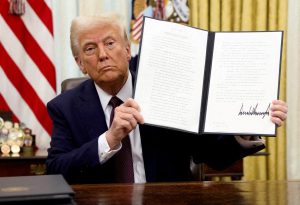EU vs US: How did they handle the COVID challenge?
Dec 13, 2020
Examining responses from nations during this state of crisis can be insightful to the state of these nations’ governments, and their ability to function in moments of panic and uncertainty. Every country around the world is different; they have different issues, different economies, different governments, and the pandemic that has raged around the globe has brought many flaws and benefits of certain governments to light. However, there are too many countries around the world to discuss all of them; instead, the focus will be kept on two major ‘groups’: The European Union and the United States of America.
First, it’s important to look at the policies each side implemented. As said above, every country has its differences, and cannot be expected to follow the exact same protocol; however, when it comes to methods that scientists have almost all agreed on (ie. masks, social distancing, etc.), the U.S and European countries have had differences in implementation. The same follows for closing businesses and preventing large crowds from gathering. In the U.S, the President didn’t give a very clear method on how states should move forward. His actions were contradictory, though President Trump did advise against large gatherings, declared a national emergency, and passed stimulus bills, he apparently “encouraged right-wing protests of social distancing restrictions in some states,” according to The New York Times. As a result, states across the U.S had a variety of responses. A big factor in what policies a state would implement was which political party had control. The Atlantic reports that, “…while anxiety about the disease is rising on both sides of the partisan divide, Democrats consistently express much more concern about it than Republicans do,” and that Democrats are more likely to pass restrictions (such as banning large gatherings, requiring masks indoors, etc.). Instead of people coming together during a time of fear and crisis, the nation became even more divided.
America’s response didn’t just hurt it’s citizens– as cases and deaths quickly climbed– but it also hurt its global reputation. Pewresearch.org says that, “the image of the United States has suffered across many regions of the globe…Part of the decline over the past year is linked to how the U.S. had handled the coronavirus pandemic,” and “Across the 13 countries surveyed this summer, a median of 84% of adults say the U.S. has done a bad job dealing with the coronavirus outbreak.” An outsider’s perspective, Elliot Mckay, who currently lives in Tokyo, says that “I don’t think the U.S handled the pandemic well at all. I think people value their immediate comfort and freedom over their future and other vulnerable people.” A more moderate perspective from Quinn Strader, a student here at McIntosh, is that, “I don’t think that the US has handled the pandemic well…I actually went and lived in Croatia for two months, and I think they handled it a lot better than the U.S has.” However, while McKay calls for a stricter lockdown, Strader opposes the U.S having one. But no matter her beliefs, Strader does say,“Even if I don’t agree with a lot of the policies that are coming out, I try to respect the decisions, as well as support my own opinion.” Unfortunately, not all Americans are so understanding. The New York Times reports that “…in Michigan, Minnesota and Ohio…protesters — many wearing red “Make America Great Again” hats — congregated in packed groups around state capitols to demand that restrictions be lifted and to demonize their governors.” It seems, overall, the U.S hasn’t done a great job. What about the EU?
The EU doesn’t have much power when it comes to issues of healthcare or medicine, which caused disorder among the member countries when trying to pool medicinal resources. As CNN writes, “From day one, the EU was fighting an uphill struggle, as it rushed to piece together a pan-European response to a healthcare crisis with no real authority to do so.” Weforum.org says, “the immediate reaction to COVID-19 in Europe was not exemplary. Critical medical health supplies were held in national warehouses while borders were closed, with a “my nation first” reaction.” They neglected to catch the threat of the virus early on, and despite some healthcare professionals raising the alarm, EU leaders “continued to move slowly, viewing the virus as a Chinese problem,” writes politico.eu. The EU also has very open borders between member countries, which is not ideal when trying to contain a virus from spreading. Not to mention, Europe is home to some of the busiest airports in the world and a major center of trade. The EU member countries’ efforts to slow case numbers by passing strict mandates and enforcing lockdowns, (most notable Italy, who employed their military and penalized citizens who broke lockdown rules with thousand-euro fines), did not stop the second wave of cases even higher than in the spring, which America also suffered from.
However, the EU does have one advantage that the US doesn’t: free healthcare. Member countries of the EU have free healthcare for all their citizens, meaning that while a citizen of the US would be hesitant towards testing for worry of a large bill heading their way, an EU citizen would not. As an article from The Guardian says, “a national health program with unified financing and governance – basically the opposite of what we have in America today – is a powerful tool in a health crisis.” The EU also passed one of the largest stimulus bills in history, though it is technically called a ‘recovery plan’. The plan allocates 1.8 trillion euros to help “rebuild post-covid 19 Europe,” according to the European Commission website. And, polls have shown that most EU citizens approve of their response. Pewresearch.org says that “More than half of adults in every EU member nation surveyed said their country had done a good job dealing with the coronavirus outbreak.” Even in Spain, which has the lowest approval rating of the surveyed countries, the approval rate was 54%. Though cases in Europe have risen just like in the States, the EU is going through a second wave, while many argue the U.S is going through its third– after failing to ‘flatten the curve’ during the summer.
Now, a vaccine is on its way, a “light at the end of the tunnel” (CNN), or so it was thought. The New York Times has compared the covid vaccines to a fire hose, stating that “A vaccine is like a fire hose. A vaccine that’s 95 percent effective, as Moderna’s and Pfizer’s versions appear to be, is a powerful fire hose. But the size of a fire is still a bigger determinant of how much destruction occurs.” Which begs the question: will nations around the world step up to the challenge? Here’s hoping.










